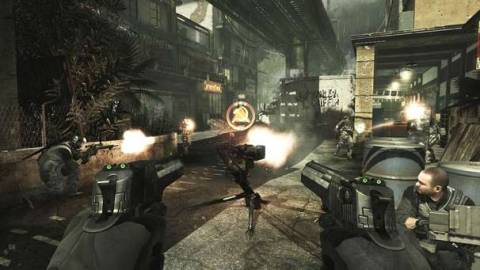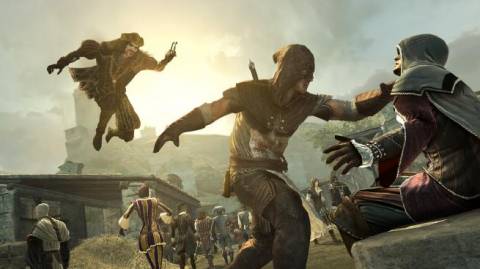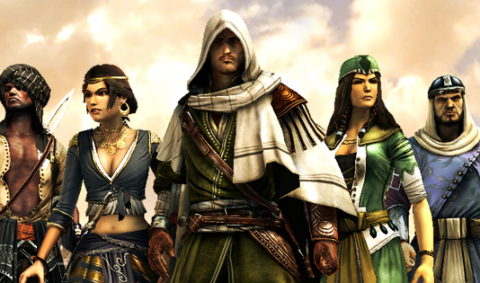The Future of Assassin's Creed
By gamer_152 8 Comments
On Wednesday 15 February Ubisoft announced Assassin’s Creed III, which will be the forth Assassin’s Creed game released for home consoles in four years, or the ninth game in four years if you want to count everything they’ve put out in-browser and on handheld devices. The Assassin’s Creed brand name is still going strong, with a reported seven million copies of Revelations being shipped, but I’ve had the feeling for a while that Assassin’s Creed seems poorly suited to the yearly blockbuster model which they seem to be locking themselves into.
What the Competition Does Differently

Perhaps this sounds like the obvious, but I think it’s worth stating; franchises from which games are released on a regular basis need to present players with the kind of games that lend themselves well to replayability. Modern action games largely do this by placing a focus on multiplayer. In single player there are a lot of specifics; it’s more scripted and fixed, so when you play through it enough times it feels like you’ve seen it all before, but when you play a multiplayer game the involvement of multiple real human beings and the focus on their actions means that an almost infinite number of different scenarios can be created, and a greater sense of variety is present in the gameplay.
The franchises which are famous for producing popular sequels are series like Halo, Call of Duty, and Battlefield; games which rely heavily on their multiplayer to provide the experience they do. Assassin’s Creed on the other hand has been a series for which the main draw has been the single-player and they’ve parcelled it out in no small portions. You’ll notice that games like Halo and Battlefield have a single-player mode of about moderate length, and the Call of Duty series likes to keep its single-player very brief. This can allow for a considerable amount of development time and resources to go into developing multiplayer, or for more Hollywood-style polish to be put on the single-player, and also makes sure that players aren’t all burned out on the single-player the next time a new game in that series rolls around.
Single-Player Syndrome
For Assassin’s Creed, since its second instalment, it’s been about adding more and more to the single-player, and I think that’s been a real strength of the series. I sunk countless hours into Brotherhood, running around the world, picking up flags, buying up stores, destroying all of Leonardo’s machines and more, but when I sit back after a job well done and Ubisoft tells me “Nice work, now you’ll do that again next year, and the year after that, and the year after that”, it doesn’t sound like an enticing prospect. Of course you could assume that even if people get sick of the single-player there’s still the multiplayer to enjoy, but that doesn’t seem to have been accepted as the winning point of the series.
I don’t think it’s any mistake that multiplayer was introduced to Assassin’s Creed when it was; I’m sure that Ubisoft saw the relationship between franchises with wildly successful multiplayer, and those same franchises being able to bring out game after game in a relatively short space of time. The original and innovative multiplayer mode they introduced in Assassin’s Creed: Brotherhood was wild and ballsy, but I believe they thought the reward for getting it right would be well worth the effort. Big name companies don’t do something this risky without some very serious potential pay-off. My worry though, is that the multiplayer in Assassin’s Creed has fundamental traits which mean it can’t be popular for an audience on the scale of a lot of other sequelised action games.
The Holes in the Multiplayer

The Assassin’s Creed multiplayer is largely built around patience and subtlety, and people aren’t patient or subtle. I don’t think the kind of people who buy up a new CoD every six months want a sly and subdued approach to player combat, they want to follow their instincts, face players head-on and constantly be seeing action on-screen. Things also aren’t helped by the fact that the Assassin’s Creed multiplayer does have somewhat of a learning curve. While the majority of the most popular games out there can take very long amounts of time to master, and undoubtedly reward more skilled players over less skilled ones, most of them still provide a kind of gameplay where the basics are immediately obvious to the player. Assassin’s Creed doesn’t have that; even quickly working out what character portraits correspond to what character models requires a little getting used to.
As bad as this may sound so far, even these facts seem a bit irrelevant until Ubisoft can get the multiplayer to appeal to the more “core” market. As it is the Assassin’s Creed multiplayer is host to a whole lot of flaws, just like you’d expect any new, innovative game to be. Revelations certainly improved on some of what Brotherhood presented, but there are still plenty of situations where you seem to get killed out of nowhere, plenty of times abilities seem to enable people to escape or kill you in ways that seem unfair, plenty of times you’re assigned targets only for them to be immediately killed, plenty of times you’ll go long stretches without being assigned a target, plenty of times the distribution of pursuers on you seems imbalanced, plenty of times where early success seems like a matter of how skilled or unskilled the target you’re assigned just happens to be, and perhaps worst of all plenty of times your target is running around on a rooftop and going after them would mean making yourself a huge target. In Assassin’s Creed, people playing with the action-oriented style they’d expect from other games, and would instinctively use, actually has the power to break the multiplayer.
Ubisoft and Their Audience
The theory that this would put people off may seem like baseless conjecture, but from my experience online, Assassin’s Creed certainly isn’t the most popular kid on the block. While other sequel-heavy franchises will have players still flocking to the multiplayer in large numbers right up to and even after the release of the next game in the series, for months before Revelations was released the Brotherhood multiplayer seemed like a baron wasteland. I live in the UK and use a connection which has an open NAT and a good upload and download speed, but I found unless I connected at a rather specific time I just couldn’t get enough players together for a match, and even when I could I saw the same names popping up over and over.
Right now there are certainly people playing the Revelations multiplayer, but from what I can tell there’s nowhere near the number you’d expect to see for an annually released game, and it’s only a few months after launch. There’s definitely not the kind of major online buzz for the Assassin’s Creed multiplayer that there is for other big multiplayer titles. It seems like a large part of the game, perhaps the very part of it that Ubisoft could be relying on to continue Assassin’s Creed as their huge yearly blockbuster series, is of a lower quality than franchises it’s competing against which release far less regularly, and that’s worrying.
Assassin’s Creed Going Forwards

Don’t mistake me, I don’t think it’s that surprising that Ubisoft are trying to make a series as successful as Assassin’s Creed into a regular thing, and this certainly isn’t a blog proclaiming that the upcoming Assassin’s Creed won’t be highly profitable. Assassin’s Creed III will have more marketing money pumped into it than any game Ubisoft has produced before, and you don’t go from seven million sales to a complete bust just like that. What I am saying though is that I wonder how long the approach they currently have to the series will be sustainable, and I certainly worry for the quality of the series as it goes ahead. Perhaps I’ll be proven wrong and the new Assassin’s Creed sequels will be an uproarious critical and financial success, and great fun to play, but I’d be lying if I said I wasn’t watching the franchise with an air of doubt right now.
Of course, if the Assassin’s Creed series is very profitable over its next few iterations, that will mean something important. Unless there are major changes made to the series’ formula in the near future, it will mean that a company has been able to create a successful annual franchise out of a game that doesn’t have a popular multiplayer component. It will also mean that they’ve been able to create a successful annual franchise out of an action-adventure game with a huge, expansive single-player component, and these are things we’re just not seeing on the market at the moment. Of course, how much the driving force behind the series is marketing and reputation, and how much of it is to do with the actual content of the games could well be a debate in itself. Thank you for reading.
-Gamer_152